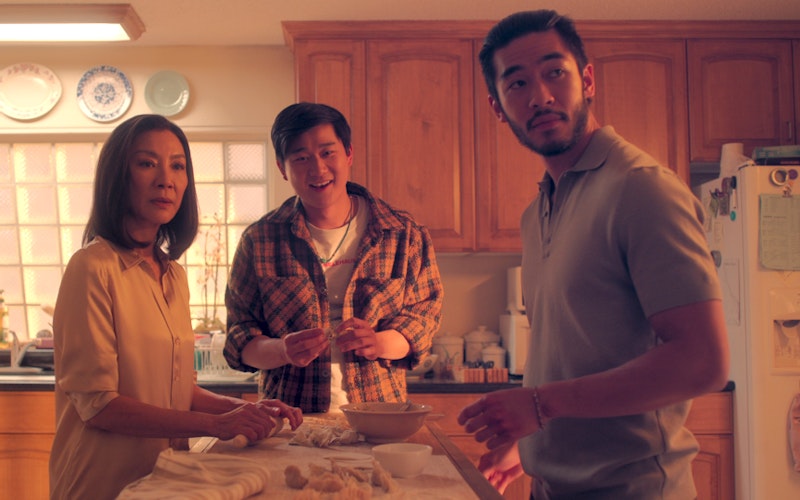
TV
The Brothers Sun and Brothers’ Keepers
My husband and I agree on most things, except on what shows to watch. So, when I suggested we check out Netflix’s The Brothers Sun, I was surprised when he nodded his approval. Not only did we binge all eight episodes, but we also reflected on what being a “brother’s keeper” means.
The Brothers Sun is an action dramedy centered on two estranged siblings who have lived their formative years apart. Raised by his crime-boss father in Taiwan, the older brother Charles (Justin Chien) was trained to be an assassin from a young age and conditioned to “保護家人” (protect the family) no matter the cost. His mother (Michelle Yeoh) and younger brother, Bruce (Sam Song Li), live across the ocean in California. When their father (Johnny Kou) is suddenly shot by an unknown sniper, Charles is instructed to leave Taiwan and go to California to provide protection, as his mother would likely be the next target.
However, once Charles arrives, he finds that the family he’s supposed to protect feels more like strangers. Because of their decades apart and split upbringings, Charles and Bruce clash on almost every ideal and value. Charles believes that Bruce should assume his role in protecting the family, whereas Bruce doesn’t want any part in the triad life. Under the tutelage of his ironfisted father, Charles was taught that filial piety means undying obedience, while Bruce, with the nurturing love of his mother, didn’t have the same family expectations put on him and was instead free to explore his passions, such as improv.
Tension and conflict within brothers isn’t a new concept, especially in Scripture. In Genesis 4, Cain kills his brother, Abel, out of jealousy and anger. The Lord asks Cain, “Where is your brother Abel?” Cain responds, “I don’t know. Am I my brother’s keeper?” With these words, Cain is vehemently rejecting all responsibility and obligations that are expected of him as a brother. He refuses to take any part in knowing where his brother is and doesn’t take accountability for his brother’s death.
Charles had many reasons to hate his brother too. Bruce had their mother’s unconditional love, the opportunity to live a normal life, and the freedom to make his own path. But instead of being bitter, Charles puts aside his personal feelings and assumes his role as Bruce’s older brother. Going beyond just protecting his brother, Charles puts in intentional effort to get to know Bruce and make up for lost time, such as attending Bruce’s first improv show and getting to know his best friend. And Bruce also reciprocates in loving his brother by giving Charles opportunities to experience a normal life, outside of the world he’s known.
Tension and conflict within brothers isn’t a new concept, especially in Scripture.
In one scene, everyone is cheerily taking turns singing off-key karaoke, but Charles remains disengaged and slumped on the couch. Within a few seconds into his song, Bruce grabs the second microphone and pulls his unwilling brother off the couch for a duet. The scene cuts to Charles and Bruce singing the chorus together, with Charles pushing away Bruce’s attempts to serenade him. The music abruptly ends and transitions to “The First Cut is the Deepest,” with Charles now singing solo. Alternating between closed eyes and gazing off into the distance, Charles sings his heart out and shows a rare moment of emotional depth and vulnerability. A bit confused yet happy at seeing this new side of his brother, Bruce listens to his brother and swings his beer in unison to show his support. By mutually opening up and inviting each other to share life together, Charles and Bruce’s relationship and affection for one another grows stronger.
Charles and Bruce are good examples of what a brother’s keeper might look like. Unlike Cain, who chose his pride over Abel’s life, Charles and Bruce prioritize each other. Before, Charles sacrificed based on duty and obligation, but now he sacrifices out of a deep love for his brother. Bruce, who wanted nothing but to preserve his own life, willingly steps into the world of crime to save his brother from it. Bruce says to Charles, “I understand what it means to be a brother. I understand that I have, and will do anything to protect you.” This statement leaves Charles speechless. Charles is used to putting his life on the line to protect others, but now his younger brother is saying that Charles is also worth the sacrifice. Bruce’s sentiment echoes John 15:13: “Greater love has no one than this: to lay down one’s life for one’s friends.”
We also have a brother’s keeper. Calling us his brothers and sisters, Jesus looks out for us and offers his care and protection. As prodigal sons and daughters, we stubbornly reject God’s love and guidance and insist on our independence. But Jesus, who has tasted the goodness of right relationship with the Father, came down from heaven to Earth, to invite us back into the Father’s love. Jesus paid the price for our rebellion through death on a cross, acting as a sacrifice for family reconciliation. He doesn’t reject or deny his role as our brother’s keeper, but instead assumes the role out of great joy and love for us.
Topics: TV